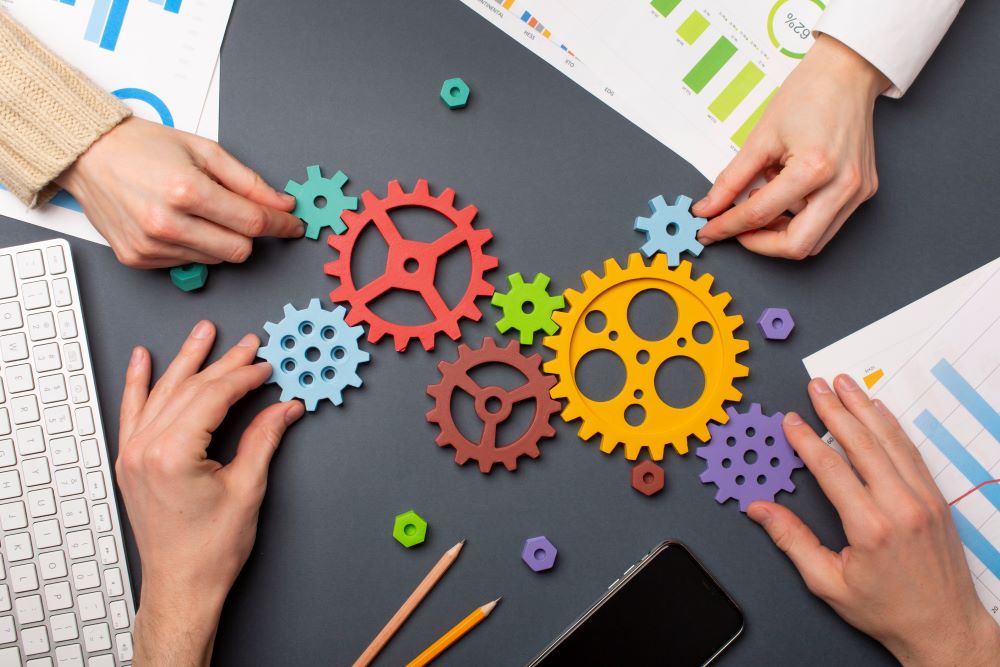Why is teamwork important in projects?
Project managers all agree that good teamwork leads to faster task completion, higher productivity and a healthy working environment. It improves morale and enables team members to overcome obstacles in project work with ease. Therefore, a collaborative team is critical in project management. In this article, we'll show you why teamwork is so important and what the benefits are, and we'll also look at how to forge a team.

The concept of teamwork
Teamwork is the process of people of different qualities and experience working together to successfully complete a project. Although it may seem like a simple task, effective teamwork does not always work.
Even finding the right team members can be a challenge, but getting professionals to work together effectively without arguments and disagreements requires considerable expertise. It requires patience, persistence, empathy and soft skills from the project leader.

The essence of teamwork: why is it important and what are the benefits?
Effective teamwork is key in project management, as the success of a project directly depends on the cohesion and cooperation of the team. Now let's look at how team strength can support effective work.- Smooth achievement of objectives
- Exploiting personal strengths
- Trust, communication and information flow
- Flexibility and adaptability
- Liability
- Dealing with conflicts
- Efficient management of material resources
- Creativity
- Greater willingness to take risks
- Effective feedback
- Easier delegation

The secret to effective teamwork: tips for project managers
The following can help you build a strong and cohesive team.
Tip 1: Create situations where team members can get to know each other
One of the most important aspects of effective teamwork is that each team member knows his or her team mates. This helps them to communicate better, set more realistic expectations and understand each other's strengths and weaknesses.
It is important that communication is not only limited to the project environment, but that there are joint activities where they can talk openly and freely, and get to know each other better. A team building provides an excellent opportunity to build trust and make communication more effective.
Tip 2: Develop your project management skills
The project leader's job is to lead the team to success without micro-managing. There is no need for the leader to constantly check progress, make suggestions and hold the team back from working independently. Good leadership skills are important to improve teamwork.
Frequent and clear, yet concise communication is essential to ensure that participants are aware of their role in the project. It is also important that everyone is able to do their job in a relaxed manner. If something is not being done properly, it may be necessary to review processes and make suggestions for better teamwork.
Tip 3: Set clear expectations and provide the right tools
Expectations are critical for project managers as they help determine the contribution of individual team members to the larger project. Even when the tasks to be done are clear, team members can struggle without the necessary tools.
So it's important to make it clear to the team that:
- exactly what we expect them to do
- when they are expected to be completed
- what quality standards to work to
They should also be provided with the right facilities and resources for the project and asked if they need anything else to work effectively.
Tip 4: Make the project leader available to the team
Team members often turn to the project manager for help with challenges, problems or errors that arise. To ensure effective teamwork, it is essential that the project manager is available to provide support to the team to keep the project moving forward.
It is important to communicate to the participants when and how they can be reached, e.g. in person, by phone, email, project management software.
Tip 5: Make communication your top priority
Communication is perhaps the most important criterion for good teamwork. A good flow of information is essential for results. It is the project manager's responsibility to lead by example, to communicate with the team whenever possible and relevant, to hold meetings to discuss project changes or to bring participants together.
How can we create a teamwork-compatible working environment?
Finally, here are some tips on how to improve team cohesion and cooperation in the day-to-day running of the project.
Use project management software
Today, excellent software is available to keep team members informed and is a great way to monitor the progress of a project. They allow you to assign tasks, talk to your team or clients from a single platform without micro-managing.
TIP: Asana, Airtable, ClickUp, Jira, Teamwork, Basecamp all make teamwork very efficient, and many of their useful features are available for free.
Setting a good example is important
As project leaders, it is essential to set an example for the team. Practice honesty, communication, tell them what you expect, set minimum standards for their performance.
It is important that both the leader and the team are accountable. This helps to ensure that each team member can take responsibility for their role in the project, rather than pointing fingers at others.
Communicate with stakeholders
The focus should not only be on communication with team members, but also on exchanging information with stakeholders and customers. This way we can be more quickly informed of any changes and communicate them to team members.
If you are a project manager and you think it is important to work well in a team, to communicate more effectively in your work and you would like to improve your skills, then take a look at our current training courses for project managers!

 Designabc
Designabc